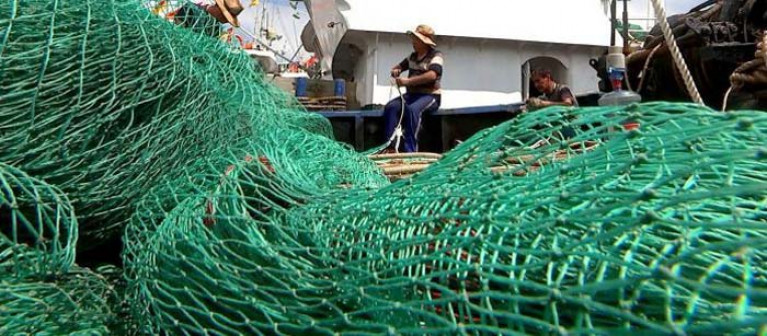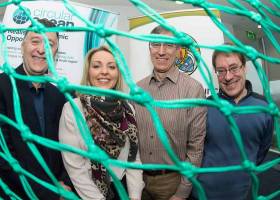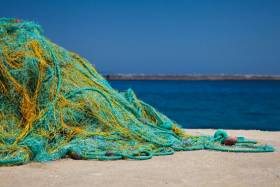Displaying items by tag: Fishing Nets
A “Clean Oceans” fishing gear retirement scheme has been announced by Minister for Marine Charlie McConalogue to mark World Oceans Day.
The project, which is aimed at collecting old and damaged fishing gear, is to take place this autumn and is being led by Bord Iascaigh Mhara (BIM).
The “Clean Oceans” initiative was established in 2019 to address the growing problem of plastics and other waste in the world’s oceans.
Almost 600 tonnes of waste has been hauled up in nets by fishers and by the wider Irish seafood industry during a series of pier and shore clean-ups, according to BIM. The initiative is supported by the European Maritime Fisheries and Aquaculture Fund.
“Protecting Ireland’s marine environment means protecting the marine habitat and protecting Ireland’s coastal communities today, and for future generations,” Mr McConalogue said.
“The livelihoods of those who live and work in these communities depend on their working environment being pristine. I am greatly encouraged by the huge efforts being made by fishers, and by the wider Irish seafood industry as part of the “Clean Oceans” initiative,”he said.
“This is an industry which is demonstrating the positive impact that is being made through working together to actively address the serious problem of plastics in our oceans,” he said.
The “Clean Oceans Initiative Fishing Gear Retirement Scheme”, as it is called, is being piloted in Ros-a-Mhíl, Co Galway later this year.
Fishers from the Ros-a-Mhíl fleet are being invited to dispose of their old and damaged gear as part of a free drop-off service at the pier. The fishing gear will then be recycled, upcycled, or disposed of responsibly, BIM says.
Vessel owners will be asked to register details of the materials they drop off to record their origin, and to allow BIM to track how they are used in the future.
BIM chief executive Jim O’Toole said that “genuine efforts are being made by the Irish seafood industry to do what it can to address the issue”.
He said collaboration across the industry and with the wider marine sector has been critical to the success of the “Clean Oceans” initiative.
Fishing Nets Can be Recycled as Skateboards, Bird feeders & Socks Under New EU Project
Skateboards, sunglasses, bicycle baskets, bird feeders and socks can all be manufactured from recycled fishing gear, a seminar at NUI Galway has heard writes Lorna Siggins
Nets, gear and other plastic material washed up on the coast could provide business opportunities in a “blue circular economy”, participants in an EU-funded research project have said.
A new EU directive on single-use plastics is driving research on recycling and re-use, with Ireland among European member states bound to establish “producer responsibility” schemes.
Fishing skippers and representatives across the marine, business and waste sectors attended the conference, hosted by the Western Development Commission at NUI Galway on January 22.
EU maritime affairs directorate official Alena Petrikovicova – de Chevilly explained that the new schemes for producer responsibility must be in place by 2024, and member states will have to establish national collection targets.
She outlined how over €15 million has been allocated from the European maritime fisheries fund for 22 research projects, including reduction of marine litter, while €18.7 million has been allocated for 26 projects underway to establish centres like “blue laboratories” testing new uses for used equipment.
There are no accurate figures for the fishing gear as a percentage of total plastic waste, according to Richard Glavee-Geo, associate professor at the Norwegian University of Science and Technology. In Norway, one estimate suggested up to 37 per cent of marine waste is linked to fishing, while 38 per cent is consumer waste, he said.
NUIG Ryan Institute director Prof Charles Spillane said it was already projected there would be more plastic than fish in the oceans by 2050 at current disposal rates.
Prof Spillane explained that the “blue circular economy “ concept was pioneered by round world sailor Ellen McArthur through the environmental foundation which she established.
Recycling and re-use of plastic constituents used in fishing gear is at an early stage in Europe, with two major recyclers – Aquafill in Italy, which recycles nylon for use in nylon yarn, and Plastics Global in Italy which turns nets into pellets.
Prof Martin Charter of the Centre for Sustainable Design in Surrey, England described how companies are exploring uses of recycled fishing , fish and shellfish farming equipment in products ranging from skateboards to dog leads to bicycle baskets.
He said Adidas was claiming that it uses gill nets in making sports shoes, but companies will have to conform to regulations which ensure that there are credible recycled constituents.
One north American company, Bureo, works directly with fishing communities on recycling, and has designed an office chair that comprises almost 14 lbs of waste fishing gear material, Prof Charter noted.
Several participants at the workshop, including Simon Rooney of Walsh Waste in Galway, noted that incentive schemes would be required to ensure the burden of cost of recycling marine litter is not placed on fishing communities.
He suggested incentives such as the car tyre and farm waste recycling schemes as options.
West Cork fisherman Niall Duffy, who is part of the Smartnet project run with Bord Iascaigh Mhara, said that legislation had been rushed through by the EU without consulting fishing communities.
Mr Duffy said it was his personal view that 80 per cent of fishing gear washed up on the Irish south-west coast was from non-Irish vessels. He also noted that skippers would not willingly discard valuable nets at sea, due to the cost.
The Blue Circular Economy initiative, which the WDC is involved in with partners in Norway, Finland, Denmark, Greenland, Scotland, Iceland and Spitsbergen, and the Faeroe Islands, aims to establish regional clusters which will mentor small and medium enterprises on “eco-innovation” related to waste fishing gear.
The three-year project is funded by the Northern Periphery & Arctic (NPA) Programme as part of the European Regional Development Fund.
As part of the European Circular Ocean project, Irish Partners Cork County Council Initiative “Macroom E” have today welcomed delegates from Norway, Greenland, Scotland and England to join with local stakeholders at an event in County Hall, Cork to discuss the future challenges and opportunities around the subject of marine plastics with a particular focus on waste fishing nets and rope.
The session was led and facilitated by Dr. Laurent Bontoux from the EU Policy Lab with support from, Professor Martin Charter from The Centre for Sustainable Design. The Circular Ocean “Scenario Exploration Session” was organised by experts from the EU Policy Lab based at the European Commission's Joint Research Centre (JRC) in Brussels. The approach for today’s event has been developed from a two year foresight study on the future of eco-industries and eco-innovation in Europe to 2035.
The issue of Marine Plastics is of ever increasing international concern, featuring heavily in the European Commission’s “Marine Strategy Framework Directive (MSFD)” which recommends “a circular economy approach which puts the emphasis on preventing waste and on recycling and reuse of materials and products in the first place, as the best solution to the marine litter problem”. Management of end of life nets is a particularly pertinent issue for Cork, as seven of the top twenty ports nationally are located with the county. The event today exhibited a showcase of innovative products made from recycled nets including a local creation by Kinsale based Mamukko who incorporated end of life fishing nets into the design of one of their award winning upcycled bags.
Speaking at the event, Michelle Green, Communications Manager said “We are delighted to have had the opportunity to welcome representatives of the Cork fishing community to this unique event and hope that today’s discussion will provide a platform for future collaboration with other agencies in seeking solutions to the challenge of marine plastic waste”.
#Fishing - 'Money for old rope' is the pitch for a new initiative that aims to recycle old fishing nets that often end up littering the seas, as the Irish Examiner reports.
A number of Irish companies have been invited to Norway later this year to explore the possibility of collecting abandoned fishing nets and other ocean waste for repurposing in various industries – such as using the rope fibres in reinforced concrete.
They will be led by Macroom E, a company started by Cork County Council to help small and medium businesses make the most of recycling initiatives.
Macroom E is a partner with Circular Ocean, a Europe-wide project hosting a showcase this September on its work to remove waste from the ocean – where plastic and 'ghost nets' remain a hazard to marine wildlife – and turn it into a useful, and profitable, resource.
The Irish Examiner has more on the story HERE.































































